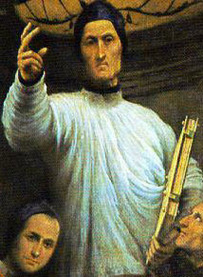
Pope Eugenius IV named him Bishop of Venice, an office which he very earnestly struggled to avoid, and which he discharged with great honour. He changed in no wise his way of living, but kept always to his beloved poverty in his table, his furniture, and his bed. He kept but a small household, saying that he had another very large one, in Christ's poor. At what hour soever any one came to see him, he was always ready to receive them, he helped all with the tenderness of a father, not refusing to charge himself with debts, that he might have wherewith to relieve misery. When he was asked with what hope he incurred these liabilities, he answered: With hope in my Master, who can easily meet them for me. And the Providence of God put not his hope to shame, but helped him amply with unexpected funds. He built several convents of nuns, for whom his watchful care ordered a more perfect way of living. He laboured much to wean married women from worldly folly and display, and to reform the discipline of the Church and the lives of all. He was indeed worthy that Eugenius should bestow upon him in the presence of the Cardinals the glory and ornament of the Episcopate, and that his successor Nicholas V should transfer the title of Patriarch from Grado, and create him, the first Patriarch of Venice.
He was eminent for the gift of tears, in which he offered up to God every day the Sacrifice of atonement. When he was so doing one Christmas Midnight, he won to see Christ Jesus in the form of a little Child exceeding fair to look upon. Such was his care of the flock committed to his charge, that it was sometime revealed from heaven that the Commonwealth had been saved by the prayers of her Bishop. He was inspired with the spirit of prophecy, and foretold many things which no wit of man could have perceived. By his prayers he often put diseases and devils to flight. Though very ignorant of letters, he wrote books which breathe heavenly teaching and godliness. When he fell into his last deadly sickness, his servants got ready a more comfortable bed for the suffering old man, but he turned away from such ease as so different from the hardness of the Cross upon which his Master had died. He ordered himself to be laid upon the planks to which he was accustomed, and when he knew that the end of his life was come, he looked up to heaven and said: O good Jesu, I am coming to thee, and so fell asleep in the Lord on the 8th day of January. How precious was his death was attested by this, that some Charterhouse monks heard Angels singing; and that the hallowed corpse, remaining unburied for two months, was whole and uncorrupted, always yielding a sweet smell, and rosy in the face. New miracles took place after his death, whereby Pope Alexander VIII was moved to enroll his name among those of the Saints. Innocent XII appointed for his Feast the 5th day of September, being that upon which he had first been enthroned in his Cathedral Church.




